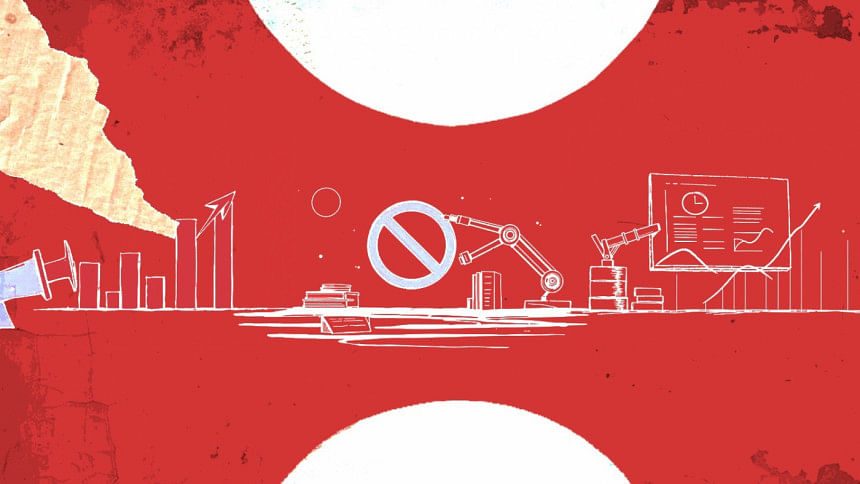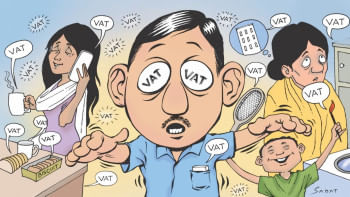How advanced analytics and automation can help prevent tax evasion

The year 2025 started with disappointment for Bangladesh, with the announcement of a significant increase in indirect taxes—value-added tax (VAT) and supplementary duty (SD)—affecting people from all income groups. Was it unavoidable? Couldn't the deficit of tax revenue be addressed by detecting and preventing tax evasion by unscrupulous wealthy individuals? A 2023 study by the Centre for Policy Dialogue (CPD) revealed that tax evasion costs Bangladesh up to Tk 223,000 crore a year. CPD further identified the loopholes through which tax evasion happens, such as: i) individuals reporting lower incomes; ii) unethical support from tax practitioners; iii) claim for more investment allowances; and iv) higher informal or cash-based transactions. It is understandably difficult, if not impossible, to close these loopholes with manual interventions. Proper automation, particularly the use of advanced AI-based data analytics techniques, can go a long way to deal with them.
The National Board of Revenue (NBR), the central authority for tax administration in the country, uses different software applications for collecting tax from various instruments, namely, income tax (e-return, recently introduced e-TDS), VAT (iVAS for organisational and EFD for retail), and customs duty (ASYCUDA). In spite of the apparent advancement in this regard, Bangladesh still has one of the lowest tax-GDP ratios in the world—around 7.5 percent (2022), compared to the Asia-Pacific average of 19.3 percent. Notably, for developing and developed countries, this ratio is 24.72 percent and 35.81 percent, respectively. In fact, according to data, only 43 lakh individuals submitted tax returns in FY2023-24, which is around 41 percent of the total TIN holders (1.04 crore, as of June 2024). Only a small portion of these returns—around seven percent, according to NBR data—go through post-assessment eventually. This low number can be attributed to a manual assessment system and a lack of enough manpower to carry it out comprehensively. Despite the NBR using several software applications for tax collection, this crucial part is still manual. Hence, the true benefits of using these software still elude us to a great extent.
Now, let's take a look at something interesting. According to informed sources, 50-80 percent of flats in Dhaka are not shown in the tax return submission of their owners. Moreover, 60-80 percent of shops across the country don't pay any tax at all, according to different sources. Relevantly, like many other ill-planned initiatives, the implementation of electronic fiscal device (EFD) to collect VAT from retail shops was surprisingly (and questionably) given to a single vendor (as a public-private partnership contract). And as we have learnt, that vendor has been able to achieve less than 15 percent of the target installation.
The NBR has taken initiatives to increase online tax return submission, suggesting that its top officials believe this would go a long way to solve our low tax-GDP ratio problem. The chief adviser also expressed hope that such an automation would reduce corruption. However, based on the perceived online adoption rate of the submitters, it can be safely assumed that there will still be more than 75 percent paper-based returns (currently more than 90 percent) in near future. Also, most of the wealthy people would submit paper-based returns through tax lawyers unless, of course, measures are taken to ensure their inclusion to the online submission filter, e.g. through appropriate incentivisation. Hence, the actual impact of online tax return submission is not likely to increase significantly as far as detecting tax evasion is concerned. So, we need to have a back-up plan. Efficiently digitising paper-based tax returns could be an option in this context, which, albeit challenging, is still possible with reasonable accuracy with the current advanced image processing technology.
Irrespective of their type, without assessing the tax returns automatically and cross-checking them with relevant data, such as mutation, electricity, gas, stock, bond, etc, it is not possible to detect tax evasion either for income tax or VAT. This demands extensive use of artificial intelligence (AI) and machine learning (ML)-based data analytics. It's high time we applied these state-of-the-art technologies to increase our national revenue. We believe that the current cabinet, being free of corruption and biases, is in a good position to make the NBR transparent and efficient.
Applying AI- and ML-based analytics to identify anomalies (e.g. non-taxpayers having significant assets, shops providing low VAT with huge electricity/gas consumptions, etc) and thereby detecting tax frauds and/or evasions is a standard practice in developed countries. But to do this meaningfully, proper integration with relevant external systems (e.g. mutation and census data, electricity and gas meter ownership, etc) and automated assessment of all tax returns (submitted online or physically) are essential. Online tax returns do help in systematically assessing the data in an automated way, which is definitely a progress towards the final goal. And what's positive is that some relevant external systems are already in a good shape to be interfaced with. For those systems, where online systems are still not available, we need to come up with a protocol to digitise and upload data at least once a year, particularly during or before the automated tax assessment event.
We have already alluded to a "Plan B" of efficiently digitising the offline tax return submission. This can be better facilitated with a carefully designed formatted spreadsheet, which should be downloadable and easily fillable by the assessees or their lawyers. It may be made mandatory that this spreadsheet must be filled up and printed if someone wants to avail the offline submission system as well. In parallel, we need to take a research and development (R&D) initiative to read, recognise and digitise such formatted printouts accurately.
The existing software used and offered by the NBR are merely designed to automate some workflows without much forethought on performing advanced tasks of identifying undeclared incomes or tax frauds. Considering the traditional (re)action of the NBR (and most other government machinery, for that matter), a cautionary note is in order: foreign off-the-shelf software will not be that effective in our somewhat peculiar context as the nature of our problem is far different from those of other countries. Rather than taking the procurement of foreign software as a solution, which they often do, the NBR should take up the strategy (adopted by Western countries) of involving ML experts to do analytics in order to detect tax frauds.
It must be noted that in Bangladesh, there is a huge challenge in getting reliable data. Hence, new techniques need to be developed to identify, with high confidence, an individual's ownerships from indirect data sources (like utility bills) as well as that of his/her family members. Thus, it is imperative that ML experts (including those from academia) are involved with the NBR IT team to employ such techniques efficiently and transparently, and that there is no interference from internal vested interest groups who have created barriers against effective automation over the years.
An overarching change in the mindset of NBR is also in order. There are allegations that it has made unnecessary procurement of foreign software, costing a huge amount of foreign currency, for the Integrated Value-Added System (iVAS), which is limited with respect to design, usability, performance, adaptability, expandability, customer support, etc. NBR needs to put its trust in our local IT expertise in this context. In fact, millions of foreign currency could be saved and better quality and contextually-appropriate software could be developed by the local industry using non-licensed, open source technology. Also, NBR needs to involve local experts in the planning and designing phase as well.
Changing NBR's mindset is also crucial in the context of strengthening its in-house IT team. The majority of the 83 members of the NBR IT team were promoted from the operator post. Around 40 engineers, who are supposed to take part in developing applications, are not involved in any significant application development, to the best of our knowledge. Are they intentionally left out? Even the simple e-TIN registration process has been developed and is maintained by vendors. Due to poor planning and technological decisions, NBR is vendor-locked in most of the cases. Most alarmingly, they are locked to some foreign vendors (e.g. for iVAS) where millions of foreign currency has been wasted. Needless to say, a number of these extravagant projects involved influential people of the last regime. We can only hope that this will change under the current management in the post-July uprising era.
Historically, NBR never involved reputed IT experts from academia in planning for development. The suggestions and recommendations of academicians and IT experts from different (procurement-related) committees, where government rules dictate the inclusion of such external experts, were usually ignored citing the limited scope of the committees. Now, under the auspices of the current apolitical interim government, there should be immediate intervention from the top to ensure proper automation and transparency. We believe that to reach the stage of a true IT-enabled revenue authority, there is no alternative to involving and engaging IT experts and academicians in the process. This may be in the form of a vibrant IT team with resident ML experts therein with involvement of one or more eminent researchers and academicians in an advisory role. An alternative and perhaps more sustainable approach could be to appoint a renowned IT expert from academia or industry as a member of NBR so that they could lead the IT transformation on a full-time basis, forming and guiding the in-house IT team of NBR. Often, engaging a reputed (local) organisation as a consultant for supervision, monitoring, and testing of to-be-developed IT systems becomes a barrier between the success and failure of an IT project. A full-time IT expert as a member would be in the right position and mindset to make such a decision prudently.
We suggest preparing a master plan/roadmap for the complete automation of NBR, perhaps in phases. This needs to be planned by IT experts, preferably through an institution with high IT expertise and fairness and transparency standards, to have the institutional backing, with a goal to identify the short-term and long-term doables for the complete transformation of the organisation. The ultimate aim would be to increase revenue, ensure transparency, prevent wastage of money, and provide better services to the stakeholders.
Dr M Sohel Rahman is professor in the Department of Computer Science and Engineering at the Bangladesh University of Engineering and Technology (BUET), and fellow of Bangladesh Academy of Sciences.
Dr Anindya Iqbal is professor in the Department of Computer Science and Engineering at Bangladesh University of Engineering and Technology (BUET).
Dr A. B. M. Alim Al Islam is professor in the Department of Computer Science and Engineering at Bangladesh University of Engineering and Technology (BUET).
Views expressed in this article are the author's own.
Follow The Daily Star Opinion on Facebook for the latest opinions, commentaries and analyses by experts and professionals. To contribute your article or letter to The Daily Star Opinion, see our guidelines for submission.

 For all latest news, follow The Daily Star's Google News channel.
For all latest news, follow The Daily Star's Google News channel. 











Comments